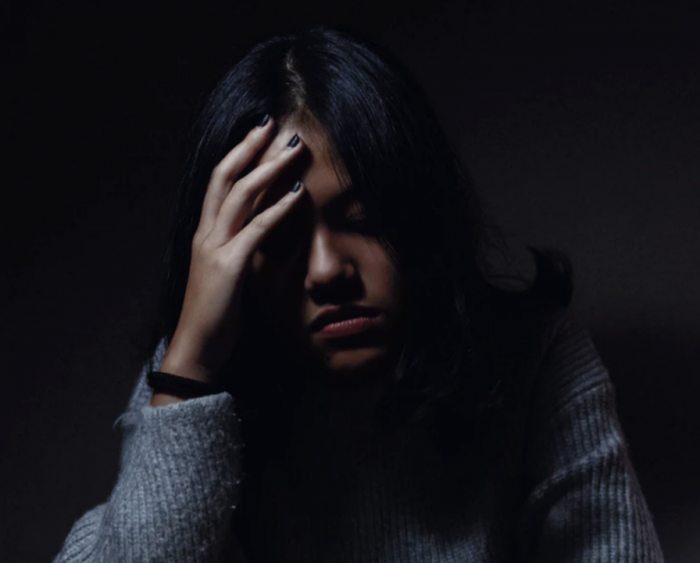*Elephant is not your doctor or hospital. Our lawyers would say “this web site is not designed to, and should not be construed to provide medical advice, professional diagnosis, opinion or treatment to you or any other individual, and is not intended as a substitute for medical or professional care and treatment. Always consult a health professional before trying out new home therapies or changing your diet.” But we can’t afford lawyers, and you knew all that. ~ Ed.
You wake up in the morning feeling like any other day.
You walk to the kitchen with blurred vision and yawning. You flip on the espresso maker as you listen to the familiar sounds of liquid pouring into your ceramic coffee mug.
The apartment is filled with the smell of a strong roast, and somehow, this coaxes your eyes to become fully alert because caffeine is joyous. As you feel the soft, furry presence of your beagle, you begin taking steps toward your bathroom, before halting in your tracks.
You realize you have been moving in autopilot, headed for the medicine cabinet where all solutions for your feeling of hopelessness lie, pretty and blue and screaming for you to finally end the madness in your mind. Depression knows you better than a lover or friend, pulling you in with its sweet song of sadness.
Now imagine if this was curable. Imagine if instead of seeking treatment for depression, you have access to a vaccine or a cure.
Preventative psychopharmacology is somewhat an oxymoron. To be able to provide a vaccine against things like depression or post-traumatic stress disorder (PTSD) is something we rarely talk about and which has never been discussed as a reality.
Fortunately, Rebecca Brachman stepped onto the scene and stumbled upon the biggest discovery in the realm of antidepressant medication in decades.
In 2016, Brachman presented a TED Talk centered around her discovery that repurposing certain drugs used for other ailments in medicine could provide potential for those to be used for other ailments in the body and mind, such as depression and post-traumatic stress disorder. The drug that she focused on and tested the most with her team is known as Calypsol.
You probably know it by its other, commonly used name “ketamine” or “Special K” on the streets.
Calypsol (ketamine) began being used in the 1960s for anesthesia, until the late 2010s when it was realized that when mice were given small doses of ketamine before being acutely stressed, they acted as if the stress never happened. This was tested over and over, and each time, the mice given ketamine before a stressful event were able to shrug off the stress and resume normal mice-like activities.
Now this drug, being highly addictive—and due to the fact that a proper dosage hasn’t been able to reach humans, so that they are not incredibly high and hallucinating or incredibly the same with no change—has many more years of testing ahead before it can be offered as a “paravaccine“ for depression and PTSD.
My question to you as a possible individual who has felt the jaws of depression’s grip, as a possible trauma survivor, as a person who can’t remember a day without anxiety, and as a human with loving-kindness in their hearts is this: What part of ourselves do we lose when we gain a vaccine for stress and trauma?
I have dealt with depression my entire adult life and carried a diagnosis of PTSD stemming from childhood trauma. I have dealt with never-ending nightmares, constant anxiety when out in large crowds, and emotional and mental shutdown when someone raises their voice at or around me.
What I have gained from these “symptoms” of depression is strength in the form of setting healthy boundaries with those I love and care about, as well as strangers. I gained the best meditation practice I have ever had, since I used it as a way to calm my anxiety when I can’t avoid anxiety-riddled places like grocery stores and concerts. Most importantly, I gained the ability to produce art in the form of words on paper because I have an ever-flowing mind that doesn’t shut off regularly or for long periods of time.
Our strength and resilience form our minds foundation. We may experience deeply traumatic times, which can build our foundation in life and help us establish what we will and won’t except in life. Our traumatic experiences might force us to set boundaries that may be uncomfortable, but are so necessary for peace.
Our art, whether you call yourself a painter, writer, sculptor, comedian, singer, or storyteller, stems from our deepest fears and traumas. We use our pain and experience to fuel our artistry and push us forward into becoming experts in our field.
Depression and PTSD are parts of life, in my opinion, just as happiness and joy are. We may not all experience this personally, but chances are that you know someone who deals with depression and/or PTSD.
My darkest days have led me to find beauty in what others might think is mundane: a rainstorm when I don’t expect it, animals who provide me with unconditional love, and friends who make my soul feel warm and validated whenever they come around.
I wholeheartedly believe that my life would feel less whole if I didn’t have my demons and light to hold onto.
Would you be willing to prevent depression and stress-related, mental health disorders if you knew you could soften your foundation?
Only time can tell what will happen regarding the usage of Calypsol (ketamine) as a “paravaccine” against stress response and depression. I hope Brachman and her team fight hard, not only in making this a reality, but in making it clear that it is a choice.
No one deserves to be sold the dream of sunshine from the podium of deceit.
~












Read 8 comments and reply